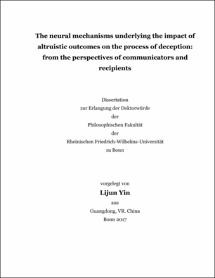The neural mechanisms underlying the impact of altruistic outcomes on the process of deception: from the perspectives of communicators and recipients

The neural mechanisms underlying the impact of altruistic outcomes on the process of deception: from the perspectives of communicators and recipients

| dc.contributor.advisor | Reuter, Martin | |
| dc.contributor.author | Yin, Lijun | |
| dc.date.accessioned | 2020-04-23T13:06:38Z | |
| dc.date.available | 2020-04-23T13:06:38Z | |
| dc.date.issued | 09.02.2017 | |
| dc.identifier.uri | https://hdl.handle.net/20.500.11811/7050 | |
| dc.description.abstract | Investigating the process of deception is crucial for our understanding of lying behaviors. In this dissertation, three studies were performed to investigate: 1) the neural bases of lying and truth-telling in two different experimental paradigms and 2) the impact of the altruistic outcomes (i.e., the outcomes of the acts that financially benefit others) on the processes of lies and truth. In Study 1, participants provided (un)truthful responses either on one’s own initiative in the spontaneous paradigm or by following others’ instructions in the instructed paradigm. The behavioral results suggest that the free choice of making one’s own decisions is one of the key components of the concept of “lies.” At the neural level, the ventral lateral prefrontal cortex, the dorsal lateral prefrontal cortex, and the inferior parietal lobe showed different activation patterns in the two different paradigms. The results suggest that these regions might provide cognitive control over the temptation of dishonest gain, particularly in the paradigms that allow individuals to freely make their decisions. In Study 2 and Study 3, the outcomes of lying/truth-telling behaviors were manipulated to investigate the neural correlates of the impact of altruistic outcomes on the processes of the behaviors in both the communicators and the recipients. The results showed that the altruistic outcomes of moral behaviors mainly modulated neural activity in the nucleus accumbens, the amygdala, and the anterior insula. The nucleus accumbens might be sensitive to both social rewards and monetary rewards. The amygdala might be involved in generating emotional responses to social outcomes, whereas the anterior insula might code deviations from socially or morally acceptable acts. Taken together, the results suggest that the neural processes underlying deception in the frontoparietal network, the limbic system, the mesolimbic system, and the insula cortex are associated with the psychological processes of deception, including cognitive control, reward coding, and emotional responses. The findings extend our knowledge of the neural processes underlying lies and truth in different contexts and with different outcomes. | |
| dc.language.iso | eng | |
| dc.rights | In Copyright | |
| dc.rights.uri | http://rightsstatements.org/vocab/InC/1.0/ | |
| dc.subject | fMRI | |
| dc.subject | deception | |
| dc.subject | altruism | |
| dc.subject.ddc | 150 Psychologie | |
| dc.title | The neural mechanisms underlying the impact of altruistic outcomes on the process of deception: from the perspectives of communicators and recipients | |
| dc.type | Dissertation oder Habilitation | |
| dc.publisher.name | Universitäts- und Landesbibliothek Bonn | |
| dc.publisher.location | Bonn | |
| dc.rights.accessRights | openAccess | |
| dc.identifier.urn | https://nbn-resolving.org/urn:nbn:de:hbz:5-46230 | |
| ulbbn.pubtype | Erstveröffentlichung | |
| ulbbnediss.affiliation.name | Rheinische Friedrich-Wilhelms-Universität Bonn | |
| ulbbnediss.affiliation.location | Bonn | |
| ulbbnediss.thesis.level | Dissertation | |
| ulbbnediss.dissID | 4623 | |
| ulbbnediss.date.accepted | 18.01.2017 | |
| ulbbnediss.fakultaet | Philosophische Fakultät | |
| dc.contributor.coReferee | Weber, Bernd |
Dateien zu dieser Ressource
Das Dokument erscheint in:
-
E-Dissertationen (642)




